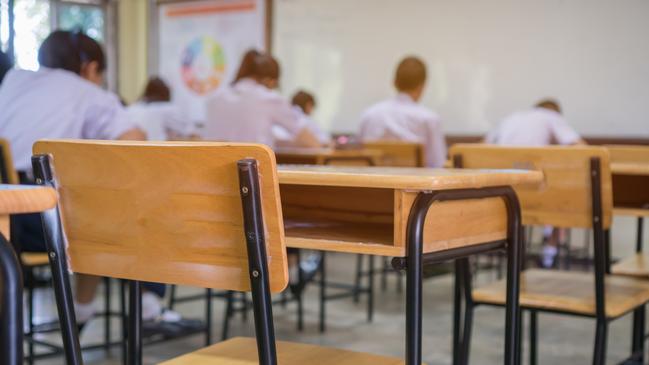Schools ‘failing weaker students’
Truancy will top the agenda of the nation’s education ministers when they meet next month, after attendance rates plunged to an alarming low last year.

Truancy will top the agenda of the nation’s education ministers when they meet next month, after attendance rates plunged to an alarming low last year.
The push to get kids back to school comes as a veteran school leader warns some high-performing schools are pushing struggling students “out the back door’’ to stay at the top of league tables.
Jim Watterson, a former director-general of education in Queensland and the ACT, deputy director-general in Victoria and regional director in Western Australia, said some principals were so eager for a promotion that they excluded disruptive or low-achieving students.
Professor Watterson, now dean of the Melbourne Graduate School of Education at the University of Melbourne, also warned that record-low school attendance levels had reached “Third World levels’’.
Federal Education Minister Jason Clare said he was “worried’’ about a long-term trend of student absenteeism, which worsened during the pandemic.
“I am worried about this and want to turn it around,’’ he said. “This is a serious issue. Covid and lockdowns have had a massive impact on the mental health of a lot of students.’’
New government data, revealed in The Australian, shows a plunge in student attendance, with half of all students missing one in every 10 school days – equivalent to a month of learning – in 2022.
Absences have doubled since the start of the pandemic, across all states and territories.
Mr Clare said he had put the issue of “school refusal” on the agenda for his meeting with state and territory education ministers next month.
He said the federal government would provide every school with funding to invest in psychologists and school counsellors, or pay for excursions and school camps, this year.
“This isn’t just about Covid,’’ he said. “Attendance rates have been declining for a decade.
“In the last eight years attendance rates have dropped in primary school and in high school, among boys and girls in every state and territory, in big cities and the bush.’’
Professor Watterson estimated that 100,000 students had dropped out of the school system since the start of the pandemic.
He said Australia now had “mass-produced education and if you don’t fit in, there’s nowhere else to go”.
“Some principals, especially in high-performing schools, don’t want (struggling) kids at school,’’ he said. “Principals do push kids out the back door to ensure the reputation of their school remains intact. They don’t want kids who don’t fit in or are disengaged, who are not going to contribute to their reputation.’’
Professor Watterson said a case had to be made for schools to take in kids who would not perform academically at a high level.
“When a young person doesn’t feel successful and is ostracised the problem gets worse and worse – kids don’t want to feel like a dummy sitting in a classroom.’’
A senate inquiry into the growing trend of “school refusal’’ has been told that gifted children, as well as those with disabilities, are falling through the cracks.
The Australian Association for the Education of the Gifted and Talented called for better training of teachers to educate gifted children, as well as more psychologists to help anxious students cope with school.
“Parents are overwhelmed and families are heavily impacted because of the career and financial stress that is produced when a child with school refusal cannot get immediate, appropriate support or requires long-term home schooling,’’ its submission states.
Sydney lawyer Deborah Boyd has a nine-year-old daughter, who is both gifted and diagnosed with autism, who has refused to attend school full-time for the past three years.
Ms Boyd even paid a tutor to sit in class and help her primary school daughter with year 12 maths. “Each year we get her back to school but they can’t provide for her academically, so she starts running away,” she said.
Ms Boyd said the NSW Education Department had suggested she homeschool or use distance education, but she felt “this isn’t a solution when dealing with special needs children’’.
A NSW Education Department spokesman said it had offered “a range of additional supports and alternative educational settings’’ to Ms Boyd’s daughter.
“We’re committed to supporting our students in every aspect of their learning so they achieve their full potential,’’ he said.
“The department will continue to work with the student’s parents to achieve the best learning outcomes.’’




To join the conversation, please log in. Don't have an account? Register
Join the conversation, you are commenting as Logout